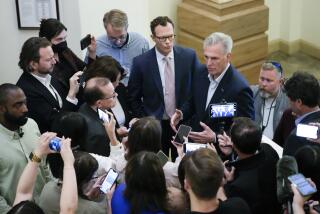U.S., Japan in Last-Minute Trade Talks
- Share via
TOKYO — While Japan has already begun receiving leaders from around the world for this week’s economic summit talks here, U.S. and Japanese officials are undergoing intensive last-minute negotiations in an effort to break a deadlock on bilateral trade talks.
The two sides hope to reach agreement based on a compromise proposal by Japanese Prime Minister Kiichi Miyazawa first outlined in a letter sent to President Clinton over the weekend.
Under the proposal, according to local press reports, Japan would agree to the use of “reference” measures to determine progress toward more open markets in Japan on the condition that Clinton makes a statement agreeing not to use retaliatory measures if progress is not achieved.
“We can’t accept America immediately moving to apply sanctions just because there is no visible progress,” Miyazawa was quoted as saying in the Nihon Keizai Shimbun, Japan’s largest business daily.
Miyazawa called together the top bureaucrats from the ministries of finance, trade and industry and foreign affairs and asked them to make an all-out effort to hammer out an agreement based on the proposal.
U.S. trade negotiators have been pushing for a new framework on trade talks with Japan that would call for the use of numerical indicators to determine Japanese progress toward opening markets. Among the targets the United States wants to set is a goal for Japan to cut by nearly half its current account surplus of more than $100 billion and boost its manufacturing imports by one-third over the next three years.
Clinton proposed during Miyazawa’s visit to Washington in April that the two nations reach an agreement on a new framework for trade talks by the time of the meeting of the world’s seven largest industrial nations this week. The new framework is meant to replace the Strategic Impediments Initiative that guided trade talks under the George Bush Administration by focusing in on structural trade barriers in Japan.
Bilateral talks in Tokyo on the new framework ended without agreement late last month, and the Clinton Administration had appeared resigned to waiting until a new Japanese government is in place following elections later this month before hammering out a final agreement.
In an exclusive interview with the Nihon Keizai newspaper, Clinton reportedly expressed a “positive outlook” regarding the new Japanese proposal.
It is unclear whether the Clinton Administration will agree to forgo the use of sanctions to pressure Japan to meet its targets. Sanctions were widely regarded as crucial in pushing Japan to reach an earlier agreement to boost the foreign share of Japan’s semiconductor market to 20%.
Some Japanese executives seem amenable to the Miyazawa proposal. “It’s OK to talk of goals if they are not unilaterally enforceable (with U.S. sanctions),” said Minoru Makihara, president of the giant trading company Mitsubishi Corp.
But there is still some uncertainty over whether the “reference” points that Miyazawa proposes will be merely used as measures of progress or whether goals will be established based on those reference points that Japan will be expected to meet.
The proposal appears to be a last-minute effort by Miyazawa to show some leadership. He has been roundly criticized in Japan for failing to make tough decisions and is blamed for what is expected to be an almost certain loss of the ruling party’s majority in upcoming elections.
More to Read
Sign up for Essential California
The most important California stories and recommendations in your inbox every morning.
You may occasionally receive promotional content from the Los Angeles Times.










